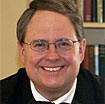Commentary on Acts 7:55-60
As truncated by the Revised Common Lectionary, this text is as unpromising as it is repulsive.
Without warning we are thrown headlong into the furious conclusion of an orthodox if long-winded sermon (Acts 7:2-50, appearing nowhere in the lectionary). The story’s characters come off no better–grinding their teeth, stopping their ears, then mobbing and stoning a pious visionary (vv. 54-60). One need not recite Stephen’s entire homily to this Sunday’s congregants. Without some sense of back story, however, they cannot possibly get the point, leaving the preacher stuck in quite literally a dead end.
Luke makes more than one point in Acts 7; the preacher needs to decide which among them will be the focus for the sermon’s delivery in a particular time and place, and which should play only supporting roles. One aim of Acts 7 is to answer a perjured charge that followers of “the Way of God” promoted Jesus by defaming the temple and Torah (Acts 6:8–7:1). “Perverting our nation” had been lodged against Jesus during his own trial before Pilate (Luke 23:1-2). Stephen’s response locates “the coming of the Righteous One,” Jesus, in the context of previous leaders who were obedient to God’s call–especially “our ancestor Abraham” (Acts 7:2-8), Joseph (vv. 9-18), and Moses (vv. 19-44), who suffered much for their faith. Situating Jesus in Israel’s history is a typical Lukan technique, crystallized in his Gospel’s infancy narrative (see Luke 1:14-17, 32-33 47-53, 68-79), his portrait of Jesus’ ministry (e.g., 3:4-6; 4:8-12; 16:16-17; 20:9-18), and Peter’s Pentecost sermon (Acts 2:17-21, 25-28, 34-36). Jesus’ coming is in synch with a host of troubled predecessors; Moses and the prophets and the psalms all point to him as their fulfillment (Luke 24:27, 44). The problem lies not with Jesus but with those “that received the law as ordained by angels, and yet … have not kept it” (Acts 7:53; cf. Luke 16:31). “Which of the prophets did your ancestors not persecute?” (Acts 7:52a).
Stephen’s rebuke of the Jerusalem temple is no Christian innovation, as the quotation from Isaiah 66:1-2 (Acts 7:49-50) underlines. The Old Testament’s Deuteronomic history testifies to Israel’s internal debate whether God is properly worshiped in a man-made house, or whether the Lord’s mobility in the wilderness tent of meeting is truer to God’s boundary-blasting character. (See 1 Kings 8:27, embedded within Solomon’s very dedication of the first temple.) For Luke the temple is a natural place for Jews to bless God and to preach Jesus as the Christ (Luke 24:51-53; Acts 3:1; 5:24-25, 42). Yet in God’s kingdom, heralded by Jesus, something greater than Solomon is here (Luke 11:31). By the time he wrote Acts, Luke may well have known that Jerusalem and its temple were devastated by the Roman legion (Luke 19:41-46; 21:20-24; Josephus Jewish War 6.314-442). For him Jesus has supplanted the temple in significance, a conclusion drawn for various reasons in other New Testament writings (cf. John 2:13-22; Eph 2:11-22; Heb 9:11-10:25). Though different in formulation, Luke’s reason is similar to that in Ephesians: God’s Holy and saving Spirit, manifest in Jesus the Messiah (Luke 2:25-26; 4:17-21), has burst Israel’s religious center and is spreading to encompass all nations to earth’s farthest reaches (Acts 1:8; 10:44-48; 28:23-28). Isaiah’s oracle of the new age was centripetal: All the nations would stream to the mountain of the Lord’s house, for training in Torah and the things that make for peace (Isa 2:1-4). Luke’s vision is centrifugal: salvation flows from Jesus, Israel’s Holy and Righteous One, outward to believing Gentiles (Acts 3:14; 11:18; 14:27).
Mark Twain–or someone else–said, “The past does not repeat itself, but it rhymes.” That is the clearest point emerging from the lectionary’s bobtailing of Acts 7: Stephen’s life and death repeatedly chime with Jesus’ own. Israel’s leaders are bent on destroying a visionary (Luke 3:21-22; 10:18; Acts 7:55-56), full of the Holy Spirit (Luke 4:1; 19:47; Acts 7:54-55), who has offered great wonders and gracious signs among the people (Luke 7:11-17; 19:35-43; Acts 6:8). On the verge of both men’s deaths, the Son of man is present at God’s right hand (Luke 22:69; Acts 7:56). Both men are abusively apprehended by a loud mob (Luke 22:63; 23:23; Acts 7:57), stripped of their garments (Luke 23:34b; Acts 7:58b), and killed before witnesses while praying for their executioners’ forgiveness (Luke 23:34a [in some manuscripts]; Acts 7:58, 60). “Father, into your hands I commend my spirit” (Luke 23:46); “Lord Jesus, receive my spirit” (Acts 7:59; both rhyming Ps 31:5): as Jesus lived and died in discordant harmony with Israel’s song, so now Stephen joins in the chorus. A bit-player on the scene–Saul (Acts 7:58; 8:1a)–emerges center-stage, to persecute the Way (8:1-3; 9:1-2; 22:4) and eventually to be persecuted for it (25:2-3).
In Easter we celebrate God’s raising from death the Righteous One, whose wounded hands and feet remain palpable (Luke 24:39). Acts 7:55-60 is a doubly cautionary tale. For those who persist in God’s way, suffering awaits. Ask Moses. Ask Jesus. Ask Stephen. Ask Paul. We terribly mislead our congregations and repudiate scripture when suggesting that, for the sake of Israel’s hope, we too are not bound by this centuries’ long chain (Acts 28:20). On the other hand, as religious people we are subject to horrible self–deception about our own righteousness, which consents to the death of witnesses for the One who alone is Righteous (Acts 7:52-53; 8:1). Like the townsfolk in Shirley Jackson’s mordantly evergreen tale “The Lottery” (1948), we are capable of honoring our rituals, sacred and secular, while murdering a fellow human right in front of us. “Which of the prophets did your ancestors not persecute?” Abraham may be our ancestor, but the God who raises up children from stones is not our patron. In this season of new life, Luke summons the church to bear fruits that taste of repentance (Luke 3:8).

April 20, 2008